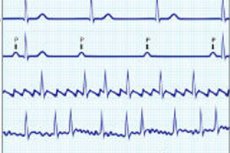Medical expert of the article
New publications
What should I not do if I have a cardiac arrhythmia?
Last reviewed: 30.06.2025

All iLive content is medically reviewed or fact checked to ensure as much factual accuracy as possible.
We have strict sourcing guidelines and only link to reputable media sites, academic research institutions and, whenever possible, medically peer reviewed studies. Note that the numbers in parentheses ([1], [2], etc.) are clickable links to these studies.
If you feel that any of our content is inaccurate, out-of-date, or otherwise questionable, please select it and press Ctrl + Enter.

A cardiac arrhythmia is a disruption in the normal rhythm of heartbeats. It is important to be cautious and avoid certain activities when you have an arrhythmia to avoid making the situation worse and reduce the risk of complications. Here's what not to do when you have an arrhythmia:
- Ignore symptoms: If you have signs of arrhythmia such as palpitations, irregular pulsations, fainting, dizziness, or shortness of breath, do not ignore them. See your doctor for diagnosis and treatment.
- Self-medication: Do not take medicines without consulting your doctor. Uncontrolled medication may worsen arrhythmias or cause side effects.
- Avoid excessive physical activity: Moderate physical activity is often recommended for arrhythmias, but avoid excessive exercise without consulting a cardiologist.
- Avoid stress: Stress and anxiety can make arrhythmias worse. Practicing relaxation techniques such as yoga or meditation can help manage them.
- Do not consume alcohol and caffeine in excess: Al cohol and caffeine consumption can aggravate arrhythmias. Limit their consumption and monitor your body's response.
- Don't smoke: Smoking is a risk factor for heart disease and can worsen arrhythmias.
- Do not skip taking prescribed medications: If you are prescribed medications to control arrhythmia or other heart problems, keep your regular scheduled appointments.
- Do not increase your medication doses without your doctor's approval: If you feel like your medication is not working, see your doctor to adjust your regimen and dosage.
- Don't neglect regular visits to your doctor: See your cardiologist for regular monitoring and evaluation of the effectiveness of your treatment.
- Do not avoid yourdoctor's advice: Follow all recommendations and instructions from your doctor to minimize the risk of complications as much as possible.
- Don't ignore prescribed dietary recommendations: If your doctor recommends that you follow a specific diet that limits salt, fats, or carbohydrates, follow those recommendations, as proper nutrition can help control arrhythmias and other heart problems.
- Do not take stimulants or illegal drugs: Stimulantand illegal drug use can have serious effects on your heart rhythm and cause dangerous arrhythmias.
- Do not overwork: Avoid excessive physical activity and fatigue, which can trigger arrhythmias. Allow your body to rest and recover.
- Do not ignore instructions on the use of pacemaker devices: If you have a pacemaker or other heart rhythm support devices, follow your doctor's instructions and have these devices serviced regularly.
- Do not take weight loss products without consulting your doctor: Many weight loss drugs can affect your heart and arrhythmias. If you want to lose weight, discuss the plan with your doctor.
- Avoid eatinglarge portions of food: Severely overeating can put more strain on the heart and cause arrhythmias in some people.
- Do not take large doses of strong coffee or energy drinks: High doses of caffeine and other stimulants can make arrhythmias worse or cause them.
It is important to remember that arrhythmia is a serious condition that requires medical monitoring and treatment. Any treatment or lifestyle changes for arrhythmias should be discussed with your doctor to determine the best approach to managing the condition.

